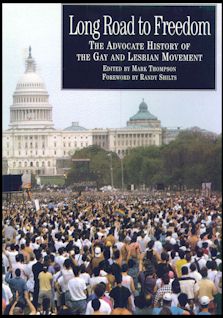 |

 |
|
|
| By Nicole Murray-Ramirez
MMOW National Co-Chair
 Honest questions deserve honest answers.
Honest questions deserve honest answers.
David Phelps' recent OpEd piece on The Advocate's website raises an interesting question about the Millennium March on Washington. But if the question is going to be raised, it deserves an answer. He asks, "But what happens at the end of the day, when the parties are over, the scaffolding is dismantled, the banners and flags are unfurled, and the amplifiers are packed away and when the trains, plans, and automobiles carry the participants home? What then?" Well, there's no need to guess or speculate. Past experience tells us exactly what will happen:
In fact, maybe it's time to set the record straight and to correct some of the erroneous information that continues to be repeated. Here are some observations based on historical perspective: First, all of the previous Marches on Washington have had a profound impact on the lives of LGBT individuals. The March headquarters has already received hundreds of messages with a similar theme: "I attended one of the earlier Marches, and it changed my life. It made it possible for me to come out. I became an activist out of that experience." In fact, by the tens of thousands there are closeted women and men who cannot and will not attend local Pride events because of family concerns or threats to employment – but who find safety and courage in coming out along with hundreds of thousands of others in the nation's capital. Second, some think this current controversy and debate are unique to the upcoming March. Not so. Controversy and debate have surrounded every previous March on Washington. And that's not bad for our community – it's good. And healthy. All voices must be heard and all views must find expression. That's why the March's Board of Directors has taken significant steps to guarantee openness and diversity. That's why town meetings and public forums are being held across the US throughout the summer and fall. That's why Internet sites are being set up so that local activists can vote on the platform for the March. Every single gay, lesbian, bisexual and transgendered person will be able to individually vote for the March's platform – making the Millennium March on Washington the most open and fully democratic March in our history. That's why the MMOW Leadership Council has been formed to guarantee inclusion of all views and to fully represent the broad diversity of our communities. Third, I suggest it's time to end the false distinction between local versus national events. Each is needed. Each has a place. Each makes a valuable contribution to furthering the goals of the LGBT communities. The national March on Washington will energize and birth a new generation of activists who will carry their energy and enthusiasm back to towns and cities across America. This is a healthy cycle.
 Fourth, the Marches on Washington have consistently birthed new organizations
and new movements. And this March will be no different. For example, the
forerunner of today's National Black Lesbian & Gay Leadership Forum was born
at the 1979 March on Washington. National Coming Out Day was born at the
1987. LLEGO, the largest LGBT Latino/a organization in the world, was born
out of a Washington March. And both PFLAG and the National Youth Advocacy
Coalition were founded from a national March.
Fourth, the Marches on Washington have consistently birthed new organizations
and new movements. And this March will be no different. For example, the
forerunner of today's National Black Lesbian & Gay Leadership Forum was born
at the 1979 March on Washington. National Coming Out Day was born at the
1987. LLEGO, the largest LGBT Latino/a organization in the world, was born
out of a Washington March. And both PFLAG and the National Youth Advocacy
Coalition were founded from a national March.
Fifth, there is an unfinished national agenda from the three previous Marches on Washington. Those who think the action is solely on the local level have overlooked the fact that not one of our demands from the first March on Washington has yet been enacted into law. There is much national work yet to be done. Jesse Jackson was right when he said to the LGBT community, "Real change won't happen from the inside without pressure from the outside. We must continue to take our message to the streets as well as to the suites." You know, it's a good question -- a really good question: What happens at the end of the day, when the March on Washington is over? What then? I think I know. Because I've witnessed it before. A new generation of activists will be birthed. Local LGBT organizations will be strengthened. Local membership and funding will rise. New organizations and movements will be born which will advance the cause of justice and equality. People will draw strength to come out of their closets. We'll make our voices heard by national political leaders. We'll mobilize one of the largest voting blocks in our nation's history. And we'll demand completion of the unfinished agenda of the previous LGBT national Marches on Washington. Together through the Millennium March On Washington for Equality we can begin a new millennium by boldly reminding our nation that far too many of our citizens are still denied basic equality under the law. Contact: MMOW2000@aol.com |

© 1997-99 BEI